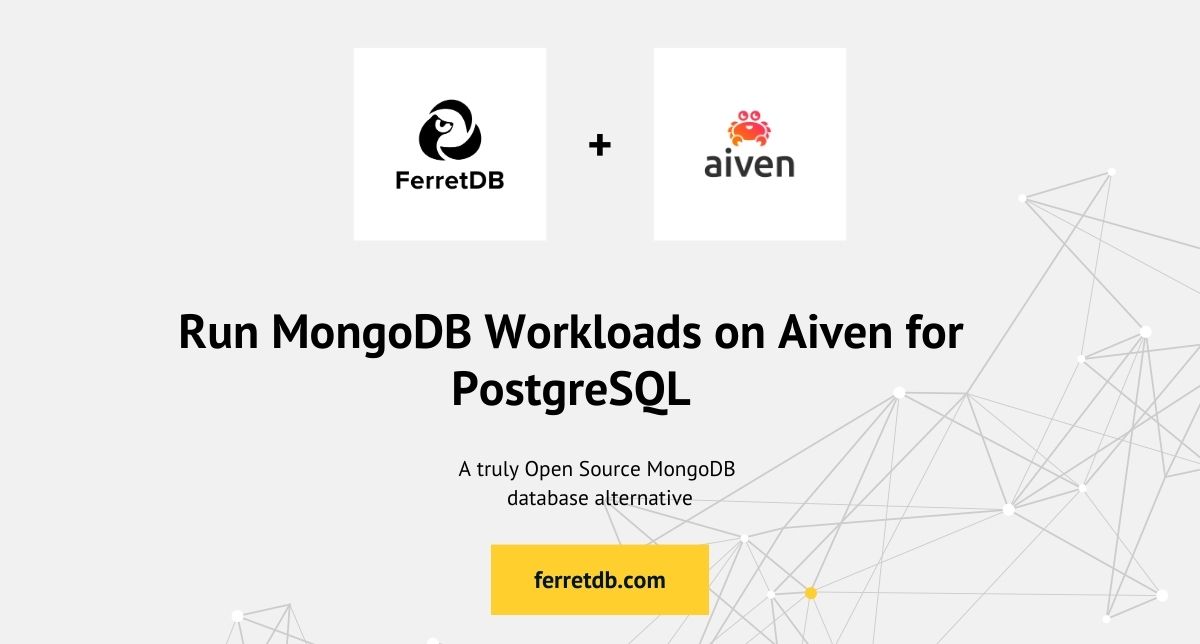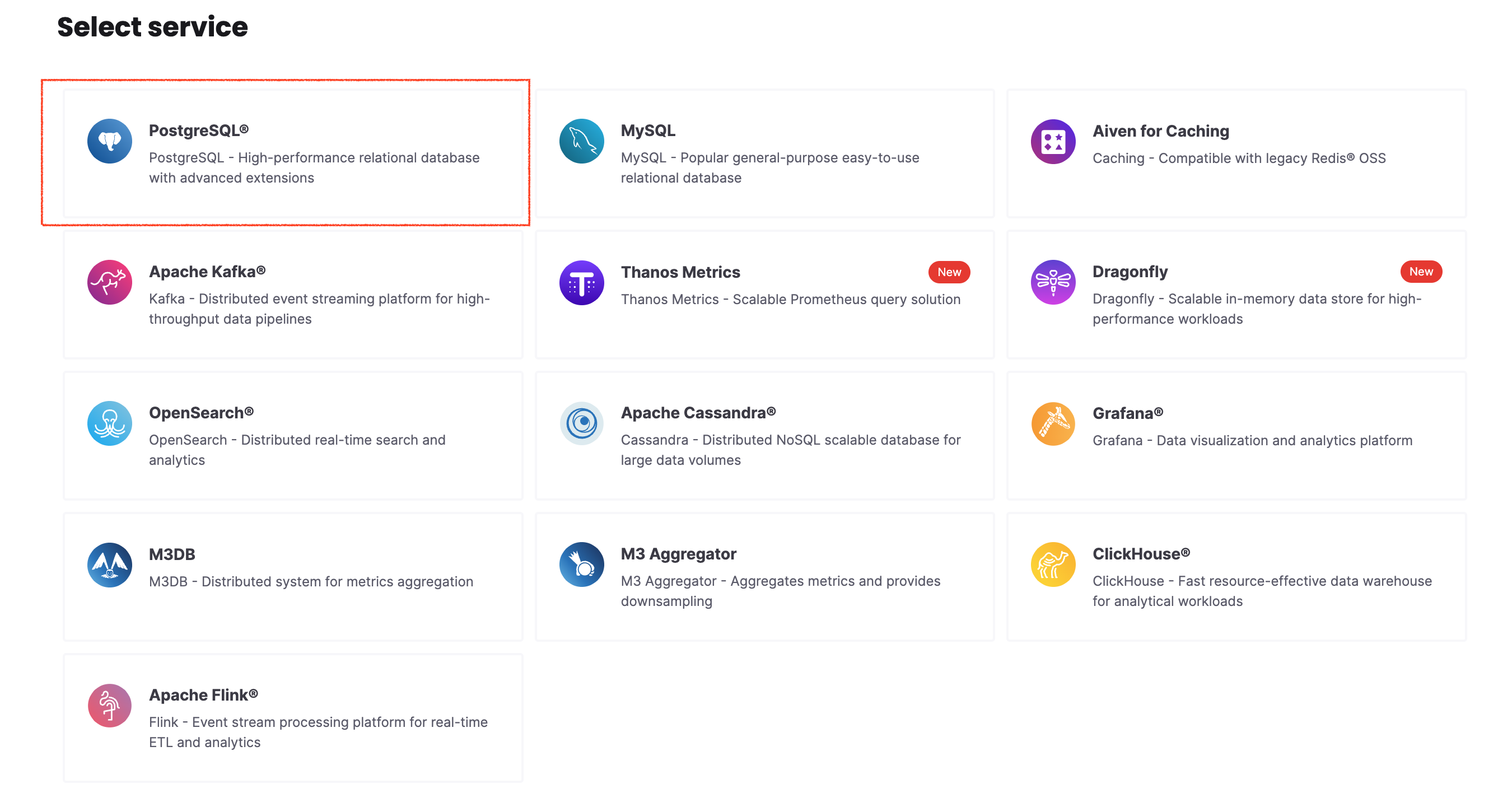Run MongoDB Workloads on Aiven for PostgreSQL

Adopting open-source solutions is a strategic move for modern businesses. For those looking to migrate from MongoDB, FerretDB is a truly open source alternative that lets you run MongoDB workloads on PostgreSQL.
With Aiven for PostgreSQL, you can set up a reliable backend for FerretDB to run your MongoDB workloads. Aiven provides a unified, cloud-agnostic platform that lets you tap into several critical features, including PostgreSQL extensions, high availability and performance, as well as integration with your existing data infrastructure.
In this blog, we'll show you how to run MongoDB workloads on Aiven for PostgreSQL using FerretDB.
Prerequisites
Before you start, ensure you have the following set up:
- Aiven account
psql- Docker
mongosh
Set up Aiven for PostgreSQL
First, create an Aiven account if you don't have one. From the Aiven dashboard, create a PostgreSQL service.

Once it's set up, your Aiven for PostgreSQL connection string should look like this:
postgres://<username>:<password>@<host>:<port>/<database>?sslmode=require
Connect to the connection string via psql, and create a ferretdb database that'll hold your FerretDB data.
defaultdb=> CREATE DATABASE ferretdb OWNER <username>;
CREATE DATABASE
Run FerretDB via Docker
To set up the FerretDB instance, specify the FERRETDB_POSTGRESQL_URL environment variable or --postgresql-url flag, and include the PostgreSQL username/password credentials for your Aiven for PostgreSQL database.
Using Docker, run the following command to set it up.
docker run -e FERRETDB_POSTGRESQL_URL='postgres://<username>:<password>@<host>:<port>/ferretdb?sslmode=require' -p 27017:27017
ghcr.io/ferretdb/ferretdb
Ensure to replace <username>, <password>, <host>, and <port> with the correct credentials.
After that, connect to FerretDB via mongosh using the below MongoDB URI format:
mongosh 'mongodb://<username>:<password>@127.0.0.1:27017/ferretdb?authMechanism=PLAIN'
Awesome! Now you can go ahead to run some MongoDB operations on FerretDB.
Perform MongoDB operations on FerretDB
As a fan of astronomy, let's play around with some arbitrary astronomy data containing details about different stars.
Insert data
Start by inserting the following data into an astronomy collection.
db.astronomy.insertMany([
{
name: 'Alpha Centauri A',
type: 'Star',
distance_from_earth: 4.37,
mass: 2.187e30,
diameter: 1214000,
constellation: 'Centaurus'
},
{
name: 'Alpha Centauri B',
type: 'Star',
distance_from_earth: 4.37,
mass: 1.804e30,
diameter: 865000,
constellation: 'Centaurus'
},
{
name: 'Proxima Centauri',
type: 'Star',
distance_from_earth: 4.24,
mass: 2.446e29,
diameter: 200000,
constellation: 'Centaurus'
},
{
name: 'Betelgeuse',
type: 'Star',
distance_from_earth: 642.5,
mass: 2.78e31,
diameter: 1.2e9,
constellation: 'Orion'
},
{
name: 'Vega',
type: 'Star',
distance_from_earth: 25.04,
mass: 4.074e30,
diameter: 2440000,
constellation: 'Lyra'
}
])
So we have an astronomy collection containing 5 documents with different star data, including their mass, diameter, and distance from Earth.
Note that the mass is in kilograms, the diameter in kilometers, and the distance from Earth in light years.
Query the data
Let's query the data for the stars in the constellation Centaurus.
ferretdb> db.astronomy.find({ constellation: "Centaurus" });
[
{
_id: ObjectId('665f00fb2d149942b1b2b4b6'),
name: 'Alpha Centauri A',
type: 'Star',
distance_from_earth: 4.37,
mass: 2.187e+30,
diameter: 1214000,
constellation: 'Centaurus'
},
{
_id: ObjectId('665f00fb2d149942b1b2b4b7'),
name: 'Alpha Centauri B',
type: 'Star',
distance_from_earth: 4.37,
mass: 1.804e+30,
diameter: 865000,
constellation: 'Centaurus'
},
{
_id: ObjectId('665f00fb2d149942b1b2b4b8'),
name: 'Proxima Centauri',
type: 'Star',
distance_from_earth: 4.24,
mass: 2.446e+29,
diameter: 200000,
constellation: 'Centaurus'
}
]
We got three results back: Alpha Centauri A, Alpha Centauri B, and Proxima Centauri.
Query data with an operator
Next, let's find out the stars with less than 1e30 kg of mass.
ferretdb> db.astronomy.find({ mass: { $lt: 1e30 } });
[
{
_id: ObjectId('665f00fb2d149942b1b2b4b8'),
name: 'Proxima Centauri',
type: 'Star',
distance_from_earth: 4.24,
mass: 2.446e+29,
diameter: 200000,
constellation: 'Centaurus'
}
]
We got only one result back with Promixa Centauri being the only star with less than 1e30 kg of mass.
Sort the data
You may also sort the documents by their distance from Earth.
ferretdb> db.astronomy.find({}).sort({ distance_from_earth: 1 });
[
{
_id: ObjectId('665f00fb2d149942b1b2b4b8'),
name: 'Proxima Centauri',
type: 'Star',
distance_from_earth: 4.24,
mass: 2.446e+29,
diameter: 200000,
constellation: 'Centaurus'
},
{
_id: ObjectId('665f00fb2d149942b1b2b4b6'),
name: 'Alpha Centauri A',
type: 'Star',
distance_from_earth: 4.37,
mass: 2.187e+30,
diameter: 1214000,
constellation: 'Centaurus'
},
{
_id: ObjectId('665f00fb2d149942b1b2b4b7'),
name: 'Alpha Centauri B',
type: 'Star',
distance_from_earth: 4.37,
mass: 1.804e+30,
diameter: 865000,
constellation: 'Centaurus'
},
{
_id: ObjectId('665f027e2d149942b1b2b4ba'),
name: 'Vega',
type: 'Star',
distance_from_earth: 25.04,
mass: 4.074e+30,
diameter: 2440000,
constellation: 'Lyra'
},
{
_id: ObjectId('665f027e2d149942b1b2b4b9'),
name: 'Betelgeuse',
type: 'Star',
distance_from_earth: 642.5,
mass: 2.78e+31,
diameter: 1200000000,
constellation: 'Orion'
}
]
View data in psql
FerretDB lets you perform a wide range of MongoDB operations – from simple queries to complex aggregations – on your PostgreSQL database. Want to see how this all looks in Postgres?
Connect to your PostgreSQL instance via psql to see the data.
ferretdb=> SET SEARCH_PATH to ferretdb;
SET
ferretdb=> \dt
List of relations
Schema | Name | Type | Owner
----------+-----------------------------+-------+----------
ferretdb | _ferretdb_database_metadata | table | avnadmin
ferretdb | astronomy_5f9854f1 | table | avnadmin
(2 rows)
ferretdb=> SELECT * FROM astronomy_5f9854f1;
_jsonb
-----------------------------------------------------------------------------------------------------------------------------------------------------------------------------------------------------------------------------------------------------------------------------------------------------------------------------------------------------------------------------------------------------------------------------------------------------------------------------------------------------------------------------
{"$s": {"p": {"_id": {"t": "objectId"}, "mass": {"t": "double"}, "name": {"t": "string"}, "type": {"t": "string"}, "diameter": {"t": "int"}, "constellation": {"t": "string"}, "distance_from_earth": {"t": "double"}}, "$k": ["_id", "name", "type", "distance_from_earth", "mass", "diameter", "constellation"]}, "_id": "665f00fb2d149942b1b2b4b6", "mass": 2187000000000000000000000000000, "name": "Alpha Centauri A", "type": "Star", "diameter": 1214000, "constellation": "Centaurus", "distance_from_earth": 4.37}
{"$s": {"p": {"_id": {"t": "objectId"}, "mass": {"t": "double"}, "name": {"t": "string"}, "type": {"t": "string"}, "diameter": {"t": "int"}, "constellation": {"t": "string"}, "distance_from_earth": {"t": "double"}}, "$k": ["_id", "name", "type", "distance_from_earth", "mass", "diameter", "constellation"]}, "_id": "665f00fb2d149942b1b2b4b7", "mass": 1804000000000000000000000000000, "name": "Alpha Centauri B", "type": "Star", "diameter": 865000, "constellation": "Centaurus", "distance_from_earth": 4.37}
{"$s": {"p": {"_id": {"t": "objectId"}, "mass": {"t": "double"}, "name": {"t": "string"}, "type": {"t": "string"}, "diameter": {"t": "int"}, "constellation": {"t": "string"}, "distance_from_earth": {"t": "double"}}, "$k": ["_id", "name", "type", "distance_from_earth", "mass", "diameter", "constellation"]}, "_id": "665f00fb2d149942b1b2b4b8", "mass": 244600000000000000000000000000, "name": "Proxima Centauri", "type": "Star", "diameter": 200000, "constellation": "Centaurus", "distance_from_earth": 4.24}
{"$s": {"p": {"_id": {"t": "objectId"}, "mass": {"t": "double"}, "name": {"t": "string"}, "type": {"t": "string"}, "diameter": {"t": "int"}, "constellation": {"t": "string"}, "distance_from_earth": {"t": "double"}}, "$k": ["_id", "name", "type", "distance_from_earth", "mass", "diameter", "constellation"]}, "_id": "665f027e2d149942b1b2b4b9", "mass": 27800000000000000000000000000000, "name": "Betelgeuse", "type": "Star", "diameter": 1200000000, "constellation": "Orion", "distance_from_earth": 642.5}
{"$s": {"p": {"_id": {"t": "objectId"}, "mass": {"t": "double"}, "name": {"t": "string"}, "type": {"t": "string"}, "diameter": {"t": "int"}, "constellation": {"t": "string"}, "distance_from_earth": {"t": "double"}}, "$k": ["_id", "name", "type", "distance_from_earth", "mass", "diameter", "constellation"]}, "_id": "665f027e2d149942b1b2b4ba", "mass": 4074000000000000000000000000000, "name": "Vega", "type": "Star", "diameter": 2440000, "constellation": "Lyra", "distance_from_earth": 25.04}
(5 rows)
(END)
Conclusion
It's hardly surprising that PostgreSQL is one of the most widely adopted open source solutions, and with Aiven for PostgreSQL as your backend, you can start running MongoDB operations on FerretDB.
To start migrating from MongoDB to the truly open-source document database alternative, check out this FerretDB migration guide.
